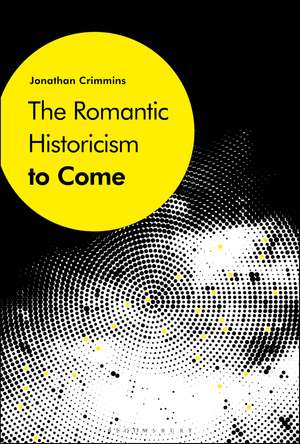The Romantic Historicism to Come
Autor Dr. Jonathan Crimminsen Limba Engleză Paperback – 30 oct 2019
| Toate formatele și edițiile | Preț | Express |
|---|---|---|
| Paperback (1) | 229.13 lei 6-8 săpt. | |
| Bloomsbury Publishing – 30 oct 2019 | 229.13 lei 6-8 săpt. | |
| Hardback (1) | 771.75 lei 6-8 săpt. | |
| Bloomsbury Publishing – 18 apr 2018 | 771.75 lei 6-8 săpt. |
Preț: 229.13 lei
Preț vechi: 296.22 lei
-23% Nou
Puncte Express: 344
Preț estimativ în valută:
43.84€ • 45.69$ • 36.30£
43.84€ • 45.69$ • 36.30£
Carte tipărită la comandă
Livrare economică 03-17 aprilie
Preluare comenzi: 021 569.72.76
Specificații
ISBN-13: 9781501359149
ISBN-10: 1501359142
Pagini: 192
Dimensiuni: 152 x 229 x 13 mm
Greutate: 0.26 kg
Editura: Bloomsbury Publishing
Colecția Bloomsbury Academic
Locul publicării:New York, United States
ISBN-10: 1501359142
Pagini: 192
Dimensiuni: 152 x 229 x 13 mm
Greutate: 0.26 kg
Editura: Bloomsbury Publishing
Colecția Bloomsbury Academic
Locul publicării:New York, United States
Caracteristici
Posits a non-teleological conception of history that steers a middle course between causality and randomness
Notă biografică
Jonathan Crimmins is Assistant Professor at the University of Virginia's College at Wise, USA. His previous work can be found in Essays in Romanticism, Studies in Romanticism, Nineteenth-Century Literature, and Diacritics. He is currently at work on a new project about 18th-century British Harlequinades.
Cuprins
AcknowledgmentsIntroduction: Mediation and the Standard Model of Romantic Historicism1 Gothic Mediation & History's Two Materialisms2 History's Body and the Historicist's Dilemma3 Freedom and the Minimum Conditions of Historicity4 Randomness, Romantic Historicism, & Walter Scott5 Romantic Temporality and Queer RevolutionIndex
Recenzii
Reflecting on liberalism's impasse--in which, as Crimmins notes, the promise of freedom has invariably resulted in waves of violence--Crimmins rescues Shelley from familiar arguments about his impotent idealism by suggesting that his 'affective politics' point the way to a future that is a praxis of care.
In this timely study, Jonathan Crimmins challenges the fundamental premise of historicism that history is a series of closed totalities characterized by discontinuity and rupture. Anchored in probing close readings of an impressive range of Romantic-era literary and philosophical works, from Kant's 'Idea for a Universal History' and Hegel's Phenomenology to Scott's Waverley and Mary Shelley's Frankenstein, The Romantic Historicism to Come argues that mediation is not an obstacle to historical understanding but its very condition. What Crimmins proposes will be of interest beyond as well as within Romantic studies: a way beyond the impasse represented by the conflicting contentions of historicist and formalist criticism.
The Romantic Historicism to Come strikingly reorients the conceptions of history we have inherited from the Romantic age. As against our prevailing sense of history as an elusive phenomenon always already 'lost' to us (an absent cause, or inaccessible structure), Jonathan Crimmins accounts for history as that which remains-persisting in and as the varied media that become the material conditions of the future, and embodying the multiple times or 'intervals' that are the substance of an experience not so neatly divided between past, present, and future as we have often imagined.
In this timely study, Jonathan Crimmins challenges the fundamental premise of historicism that history is a series of closed totalities characterized by discontinuity and rupture. Anchored in probing close readings of an impressive range of Romantic-era literary and philosophical works, from Kant's 'Idea for a Universal History' and Hegel's Phenomenology to Scott's Waverley and Mary Shelley's Frankenstein, The Romantic Historicism to Come argues that mediation is not an obstacle to historical understanding but its very condition. What Crimmins proposes will be of interest beyond as well as within Romantic studies: a way beyond the impasse represented by the conflicting contentions of historicist and formalist criticism.
The Romantic Historicism to Come strikingly reorients the conceptions of history we have inherited from the Romantic age. As against our prevailing sense of history as an elusive phenomenon always already 'lost' to us (an absent cause, or inaccessible structure), Jonathan Crimmins accounts for history as that which remains-persisting in and as the varied media that become the material conditions of the future, and embodying the multiple times or 'intervals' that are the substance of an experience not so neatly divided between past, present, and future as we have often imagined.
